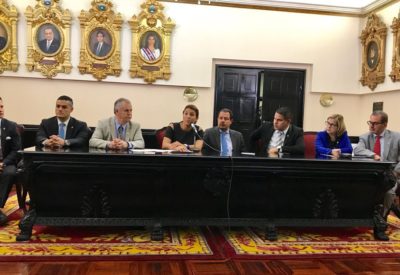Latin American Legislators Reproach Costa Rica Government’s Attempts to Abuse the Human Rights System

A delegation of the Hemispheric Congress of Legislators visited Costa Rica last week. Its members denounced the recent attempt of the Government of President Luis Guillermo Solis Rivera to introduce same-sex marriage and institutionalize gender theory in the country bypassing the legislative process. The Government recurred, instead, to the Inter-American Court of Human Rights and to its non-binding pronouncements.
In May 2016, the Government of Costa Rica asked the Inter-American Court for an advisory opinion on the issues of “gender-change,” and on the legal regime of same-sex unions, which—the delegation pointed out—are topics that fall within the exclusive competence of the Member States of the Organization of the American States (OAS). Gender theory and same-sex unions are nowhere mentioned in the American Convention of Human Rights.
Although the opinions of the Inter-American Court are not binding, Costa Rican Government admitted, last July, its intention was to have a pronouncement that could be then used as a regional regulation, avoiding the legislative process.
The visiting delegation expressed this and other concerns to several representatives of the Costa Rican legislature. Its members reaffirmed the principles which serve as the founding basis of the Hemispheric Congress itself, enshrined in the “American Declaration Regarding the Independence and Self-Determination of Peoples on Matters Relating to Life, Family and Religious Freedom,” also known as the “Mexico Declaration”.
In particular, the signatories of the Mexico Declaration reject any interpretation of the American Convention on Human Rights that promotes, “the creation of an alleged international obligation to authorize or subsidize voluntary abortion or expand scenarios where abortion is not punishable; or that limits the right of conscience of those that for serious reasons refuse to cooperate with voluntary abortions;” “that seeks to alter the definition of marriage as a union between man and woman in the internal legal order of States that are parties to the Convention or that seeks to create an alleged obligation of States to authorize to authorize the adoption of children by same-sex couples;” “that categorizes as discriminatory any moral or religious opposition to the recognition or legal protection of same-sex unions.”
The Declaration, presented in June 2016, was signed by more than six hundred American legislators from all Member States of the OAS.
The Hemispheric Congress of Legislators rests on the idea that the Inter-American Human Rights system is fundamental for the protection and advancement of human rights in the Hemisphere. At the same time, its concern is the system’s abuse, to advance hidden and never agreed agenda, violating the OAS Charter, regional agreements, and states’ sovereignty.
Members of this first country visit of the Hemispheric Congress were Colombian Senator Paola Holguín, Guatemala MP Luis Hernández, and Mexican MP Apolinar Casillas. They shared their concerns with their local colleagues,
“We need a strong Organization of the American States, strong Inter-American Commission and Court of Human Rights to defend democracy and human rights in the region,” Senator Holguin said, “but they must respect the sovereignty of the Member States in all the areas that fall within their exclusive competence.”
“Regardless of the individual views on these controversial topics,” affirmed Congressman Casillas, “we must recognize that is the Parliament of each country, with its elected Parliamentarians, to have competence to discuss and decide on these matters. Our debate with the OAS is not ideological, but it is a demand to respect the sovereignty of the Member States as well as their legislators.”
Costa Rican MPs Mario Redondo and Fabricio Alvarado, both signatories of the Mexico Declaration, endorsed the goals of the Hemispheric Congress.
View online at: https://c-fam.org/turtle_bay/latin-american-legislators-reproach-costa-rica-governments-attempts-abuse-human-rights-system/
© 2025 C-Fam (Center for Family & Human Rights).
Permission granted for unlimited use. Credit required.
www.c-fam.org

